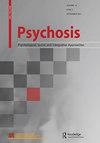Is designing therapeutic? A case study exploring the experience of co-design and psychosis
IF 1.2
4区 医学
Q4 PSYCHIATRY
Psychosis-Psychological Social and Integrative Approaches
Pub Date : 2022-04-27
DOI:10.1080/17522439.2022.2052450
引用次数: 4
Abstract
ABSTRACT Background A co-design project, consisting of individual and collective design activities, was organized with clients of a mental health service, in order to explore its potential to support people with psychosis. The group met for approximately two hours, weekly, for six months, participating in design activities and collectively deciding on the project purpose and outcome – a boardgame. Methods The experience of one group participant (Anthony) is explored, selected as the first case study within an Interpretative Phenomenological Analytical (IPA) framework. Following IPA’s ideographic focus, Anthony’s case was purposefully selected, as it portrayed a detailed picture, informing theoretical reflection on designing as therapeutic. The paper includes Anthony’s first-hand account, combined with an analysis of data from three semi-structured interviews, photographic evidence and a reflective diary kept by the lead researcher. Results Results suggest that, for Anthony, design activity: a) helps developing a sense of agency b) is experienced as grounding in reality c) contributes to the development of inter-personal relationships, and d) has a different sense of rhythm than artistic practice. Discussion These results are contextualized within literature on the lived experience of psychosis and suggest that designing can be beneficial for people with psychosis, providing the backdrop for further research and practice.设计有治疗作用吗?一个探讨共同设计与精神病经验的案例研究
【摘要】研究背景:与某心理健康服务机构的客户组织了一个由个人和集体设计活动组成的协同设计项目,以探索其对精神病患者的支持潜力。小组成员每周开会约两小时,持续了六个月,参与设计活动,共同决定项目的目的和结果——一款桌面游戏。方法探讨了一位小组参与者(Anthony)的经历,并将其作为解释现象学分析(IPA)框架内的第一个案例研究。遵循IPA的表意学重点,有目的地选择Anthony的案例,因为它描绘了一个详细的画面,为设计作为治疗提供了理论反思。这篇论文包括安东尼的第一手资料,结合了对三次半结构化访谈的数据分析、照片证据和首席研究员保存的反思日记。结果表明,对安东尼来说,设计活动:a)有助于培养一种能动性;b)作为现实的基础;c)有助于人际关系的发展;d)与艺术实践相比,具有不同的节奏感。这些结果在精神病患者生活经历的文献中被语境化,并表明设计可以对精神病患者有益,为进一步的研究和实践提供了背景。
本文章由计算机程序翻译,如有差异,请以英文原文为准。
求助全文
约1分钟内获得全文
求助全文
来源期刊
CiteScore
2.20
自引率
8.30%
发文量
36

 求助内容:
求助内容: 应助结果提醒方式:
应助结果提醒方式:


